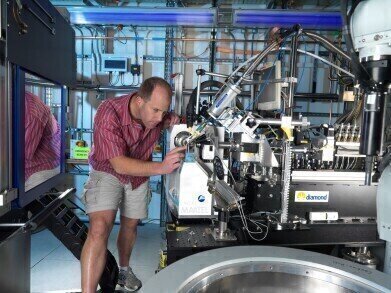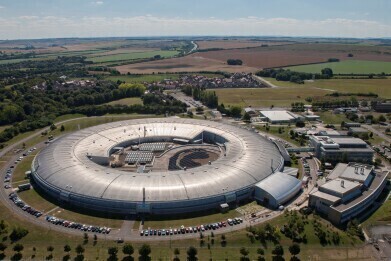-
---Copyright-of-Diamond-Light-Source-Ltd.jpg) Covid Moonshot Collaborators – left to right: Benjamin Perry, Discovery Open Innovation Leader at DNDi; Frank von Delft, Professor of Structural Chemical Biology at the University of Oxford and Principal Beamline Scientist at Diamond Light Source; John Chodera, Associate Member at the Memorial Sloan Kettering Cancer Center and founding member of the Folding@home Consortium; Annette von Delft, Translational Scientist at the University of Oxford ; Ed Griffen, Technical Director and co-founder of MedChemica; Alpha Lee, Chief Scientific Officer at PostEra and Faculty Member at the University of Cambridge. (Credit: Diamond Light Source)
Covid Moonshot Collaborators – left to right: Benjamin Perry, Discovery Open Innovation Leader at DNDi; Frank von Delft, Professor of Structural Chemical Biology at the University of Oxford and Principal Beamline Scientist at Diamond Light Source; John Chodera, Associate Member at the Memorial Sloan Kettering Cancer Center and founding member of the Folding@home Consortium; Annette von Delft, Translational Scientist at the University of Oxford ; Ed Griffen, Technical Director and co-founder of MedChemica; Alpha Lee, Chief Scientific Officer at PostEra and Faculty Member at the University of Cambridge. (Credit: Diamond Light Source) -
 Frank von Delft, Principle Beamline Scientist 104l (Credit: Diamond Light Source)
Frank von Delft, Principle Beamline Scientist 104l (Credit: Diamond Light Source) -
 Aerial view of Diamond Light Source (Credit: DLS)
Aerial view of Diamond Light Source (Credit: DLS) -
.jpg) Gianluigi Botton CEO Diamond (Credit: DLS)
Gianluigi Botton CEO Diamond (Credit: DLS)
Research News
Crowdsourcing powers early discovery for SARS-CoV-2
Dec 19 2023
Celebrating World Science day during November, a study has emphasised the success of the COVID Moonshot Consortium’s use of crowd sourcing and Open Science to accelerate its discovery of both a potent SARS-CoV-2 antiviral lead compound and the launch of a patent-free antiviral discovery program for rapid lead development in response to a pandemic emergency.
Triggered by a Twitter appeal, COVID Moonshot started as a spontaneous virtual initiative in March 2020, attracting more than 200 scientists and students from academia and biopharma to join forces in an unprecedented, fully open collaboration, which rapidly identified and developed novel compounds with excellent antiviral activity against a key enzyme of the SARS-COV-2 virus, namely the main protease (Mpro). The candidate, a non-covalent, non-peptidic inhibitor scaffold with lead-like properties that is differentiated from current main protease inhibitors, is now in pre-clinical evaluation in collaboration with the Drugs for Neglected Disease initiative (DNDi).
Leveraging machine learning, exascale molecular simulations and high-throughput structural biology and chemistry and Diamond Light Source’s XChem facility for crystallographic fragment screening, the team were able to generate a detailed map of the structural plasticity of the SARS-CoV-2 main protease, extensive structure-activity relationships for multiple chemotypes and a wealth of biochemical activity data, which shared openly, created a rich open and IP-free knowledge base for future anti-coronavirus drug discovery.
By making all data immediately available, with all compounds purchasable from the Ukrainian chemistry supplier Enamine, the consortium aims to accelerate research globally along parallel tracks following up on their initial work. “The data set enclosed in the Science publication provides a unique resource linking comprehensive structural data, fragment hits, multiple chemical scaffolds, as well as biochemical and cellular assay data that can be viewed and exploited by other scientists”, said Dr Lizbe Koekemoer, a lead author and team leader at the Centre for Medicines Discovery, University of Oxford.
Dr Annette von Delft, University of Oxford adds; “This publication showcases the enormous value that crowd-sourcing can bring to drug discovery. The COVID Moonshot project has been unique in its collaborative approach and commitment to open science and demonstrates how collaboration can be a driver for innovation.”
“Every day at Diamond, we are proud to be working with leading scientists and academics from all over the world like the COVID Moonshot Consortium, who are conducting innovative and inspired research using our facility. Bringing together experts in physical and life science innovations, cross disciplinary teams, and access to collaborative facilities allows our users to shine their brilliance on new technologies, treatments, sustainable materials and climate solutions for the many 21st century challenges we face,” comments Diamond’s new CEO, Gianluigi Botton.
The discovery platform collaboration that spontaneously formed as the COVID Moonshot now continues its work as the ASAP discovery consortium, which stands for AI-driven Structure-enabled Antiviral Platform, aiming to discover and develop novel broad-spectrum small molecule inhibitors against coronaviruses, flaviviruses and enteroviruses for pandemic preparedness.
The initiative is a collaborative effort of the Nuffield Department of Medicine at the University of Oxford; Diamond Light Source; PostEra; Weizmann Institute of Science; MedChemica Ltd; Icahn School of Medicine at Mount Sinai; Enamine Ltd; Memorial Sloan Kettering Cancer Center; and Thames Pharma Partners LCC.
Covid Moonshot paper: Open Science discovery of potent noncovalent SARS-CoV-2 main protease inhibitors DOI 10.1126/Science.abo.7201
More information online
Digital Edition
ILM 49.5 July
July 2024
Chromatography Articles - Understanding PFAS: Analysis and Implications Mass Spectrometry & Spectroscopy Articles - MS detection of Alzheimer’s blood-based biomarkers LIMS - Essent...
View all digital editions
Events
Jul 28 2024 San Diego, CA USA
Jul 30 2024 Jakarta, Indonesia
Jul 31 2024 Chengdu, China
ACS National Meeting - Fall 2024
Aug 18 2024 Denver, CO, USA
Aug 25 2024 Copenhagen, Denmark

-with-research-lead-Dr-Sandro-Ataide-and-first-author-Rezwan-Siddiquee-(right)---C.-Photo-Fiona-Wolf-USYD.jpg)


24_06.jpg)













